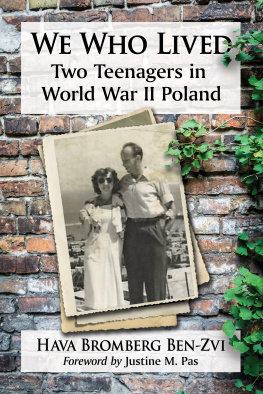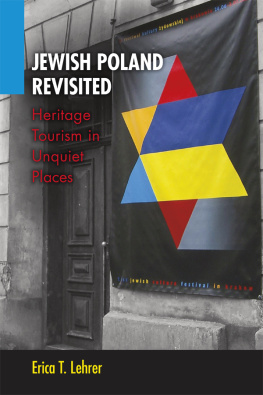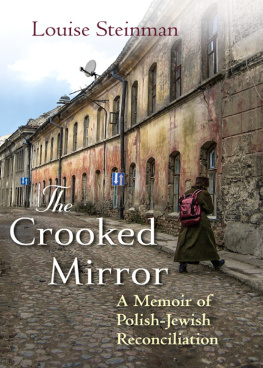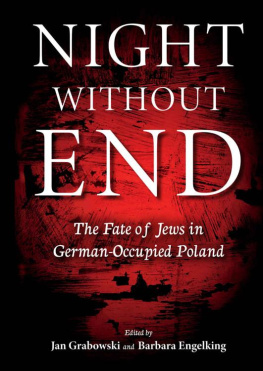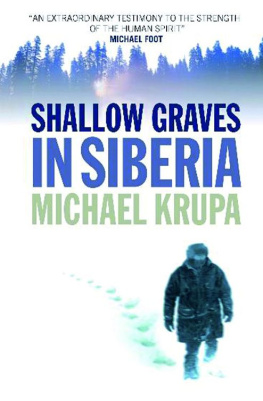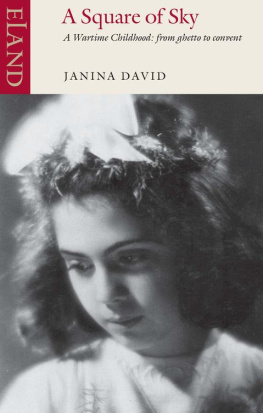
WE WHO LIVED
Two Teenagers in World War II Poland
Hava Bromberg Ben-Zvi
Foreword by Justine M. Pas

McFarland & Company, Inc., Publishers
Jefferson, North Carolina
LIBRARY OF CONGRESS CATALOGUING DATA ARE AVAILABLE
BRITISH LIBRARY CATALOGUING DATA ARE AVAILABLE
e-ISBN: 978-1-4766-3119-6
2018 Hava Bromberg Ben-Zvi. All rights reserved
No part of this book may be reproduced or transmitted in any form or by any means, electronic or mechanical, including photocopying or recording, or by any information storage and retrieval system, without permission in writing from the publisher.
Front cover photograph: Hava and Ephraim Ben-Zvi following their wedding, 1950 (authors collection)
McFarland & Company, Inc., Publishers
Box 611, Jefferson, North Carolina 28640
www.mcfarlandpub.com
To the memory of my husband, Dr. Ephraim Ben-Zvi,
for love and support everlasting.
In memory of my father, Herman Bromberg,
who perished in the Holocaust.
In memory of my mother, Dinah, my brother, Michael,
and all Holocaust martyrs.
For my son, Henry, my daughter-in-law, Molly, and my
grandchildren, Sarah, Daniel, and Michael.
Acknowledgments
I owe a debt of gratitude to my first editor, Amy Donley, for her kindness, insight and hard work.
I express my deepest gratitude to individuals, publishers and organizations for their gracious permission to reprint their materials and use them in my book. They are:
Ziselman of Honcharska Street, a memoir by Nina Luszczyk Ilienkowa, retold and translated by Hava Bromberg Ben-Zvi, used by permission of Anna Engelking and by Vallentine Mitchell. Previously published in Hava Bromberg Ben-Zvi, ed., Portraits in Literature: The Jews of Poland: An Anthology. London: Vallentine Mitchell, 2011, pp. 101104, and also in Nina Luszczyk Ilienkowa, Ziselman z Honczarskiej, Warsaw Quarterly Regiony 1, no. 96 (2000): 1416. Pani (Mrs.) Nina, a member of a Polish-Belarus family, was born and resided in the capital of Polesie, Pinsk, in Belarus. She exemplifies the complex, mixed religious and ethnic makeup of the area, where Poles, Jews and other people of Belarus lived together.
The United States Holocaust Memorial Museum, Washington, D.C., for their cooperation and gracious permission to use many of their photographs.
Four Days in August: A Familys Last Journey, a memoir by Irene Eber, used by permission of Irene Eber. Previously published in Moment, vol. II, no. 5 (May 1986): 3746. Irene Eber is a Louis Frieberg Professor of East Asian Studies (emerita) at the Hebrew University of Jerusalem and a Senior Fellow at the Harry S Truman Research Institute. She is the author or editor of eight scholarly books on Chinese history and thought. Irene Ebers book, The Choice: Poland, 19391945, Schocken Books, 2004, is a memoir about defeating deportation and death in wartime Polands atmosphere of fear and desperate hope belongs to what is most poignant in the vast literature of the Holocaust. Comment by Elie Wiesel.
Yigael Yadins letter (in Chapter 19), used by permission of Orly and Littal Yadin, Yigael Yadins children, and by permission of HarperCollins. Previously published in Martin Gilbert, Israel: A History. New York: William Morrow, 1998, p. 203.
The Silver Platter, by Nathan Alternam, used by permission of ACUM, Israel, on behalf of the authors heir, Nathan Slor, and the University of Texas Press. Previously published in No Rattling of Sabers: An Anthology of Israeli War Poetry. Translation and introduction by Esther Raizen. Austin: University of Texas Press, 1995.
Carol Grimes, for her permission to reprint experts from her eulogy for Dr. Ephraim Ben-Zvi (in Chapter 22).
Otynia (Chapter 17) including the section on the destruction of the Jews of Otynia, published online at www.shtetlinks.jewishgen.org/Ottynia/ottynia.htm and used by permission of Philip Spiegel. This portion was translated by Spiegel from the Encyclopedia of Jewish Communities (Pinkas HaKehilot in Hebrew), vol. II. Jerusalem: Yad Vashem, 1980. Spiegels translation became the initial version of the information on the internet. He also translated into English a book by Mykhailo Khavlyuk: Otyniya: Historical Essays. Ukraine, 1998. Selected information from this book, pages 5657, was consulted as one of the sources I have used for my present work. Spiegel is the author of Triumph Over Tyranny: The Heroic Campaign That Saved 2,000,000 Soviet Jews, 2008. See www.triumphovertyranny.com.
The First Ottynier Young Mens Benevolent Society and Life in Otynia (Chapter 18) appears online at www.shtetlinks.jewishgen.org/Ottynia/ottynia.htm used here by permission of Herbert Latner and Norman Latner.
Information about the Jewish National Fund and photographs of the Blue Box used by permission of Jodi Bodner.
I will always be grateful to my mentors and editors: Dr. Justine M. Pas of Lindenwood University; Irene McDermott of the Crowell Public Library, City of San Marino; Marti Tippens Murphy of Facing History and Ourselves; Jeanette Shelburne, a wonderful teacher and her entire Simon Wiesenthal Center Writing Class; and especially Madeleine Isenberg.
Sarah D. Ben-Zvi, my granddaughter, whose participation and contribution to my work will always warm my heart.
My niece, Shulamit Toledano, for her help and dedicated research.
My special thanks are due to Julek Sokal, Ephraims brother, for all the information he has given me about their early life and about life in Otynia and Siberia.
To Linda Rourman and Alice Shulman for their assistance.
To Kay Haugaard and to my friends and assistants who were always there: Carolyn Coleman, Pearl Tyree and Giovanna Fradkin for their help and advice; Shlomo Leon, for much information; Bertha Marston; Marlena Pfeifer; Zygmund and Maryla Bromberg; all the members of the Arroyo Writers group; Hannah and Norman Ackerman; and Lisa Silverman of the Sinai Temple Library, Los Angeles.
To the staff of the Crowell San Marino Public Library, and particularly Jeff Plumley.
Brita Richardson, for her scholarship and patience.
I gratefully acknowledge the wonderful resources and support of the staff of the Hebrew Union College Library in Los Angeles: Dr. Yaffa Weisman, Sheryl Stahl and their entire crew. Jessica Phillips and Yukika Skorpil, the staff of the Pasadena Public Library, the Simon Wiesenthal Center Library.
And my deepest thanks for the help and support of my son, Henry Ben-Zvi, always.
Foreword
by Justine M. Pas
Writing about the past is never easy. For survivors of the Shoah, revisiting the past involves an emotionally grueling return to incredibly frightening and heartbreaking events that, as many survivors relate in their stories, they tried to forget. Hava Bromberg Ben-Zvi echoes this sense of wanting to forget, or at least not thinking about the past, when she recalls in her preface that she and her husband Ephraim rarely discussed their wartime ordeals. They needed to concentrate on the demands of the present, which, immediately after the founding of Israel, were far from easy. Having been children during the war who carried burdens of unbelievable enormity, both Hava and Ephraim became adults who created a family together and forged independent careers, all the while keeping the past at bay. As Hava explains in the preface, she wrote this book not because she felt the need to create order out of chaos, but because she felt compelled to build a textual memorial to each and every person who, as she reminds us, faced death individually and alone.
Next page
